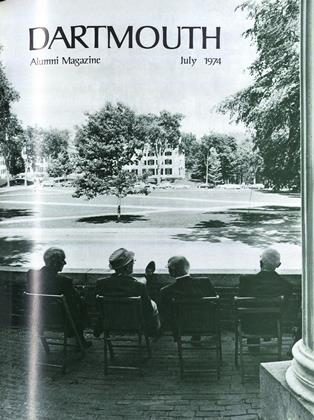Edited by David Hsin-fu Wand(David Rafael Wang '55). New York:Washington Square Press, Pocket Books,1974. 308 pp. $1.95.
Professor Wand has assembled an anthology in which the term "Asian-American" refers to a bewildering variety of peoples. The book contains the writings of immigrants to America from China. Japan. Korea, and the Philippines, and of native-born Americans of Asian descent. There is even a short section of translations of traditional Polynesian oral poetry, not strictly Asian or American, but the avocation of the editor, who was born in China but has long lived in this country.
This diversity of peoples, national origins, and cultural backgrounds creates a broad literary territory: short stories about the hopeful arrival and disillusionment of immigrants to America; an essay on the shameful imprison- ment of thousands of American citizens of Japanese descent during World War II; and an essay about the Charlie Chan, Fu Manchu, kung Fu stereotypes of Asians (principal roles played by Caucasians, of course) in movies and television.
The poetry also covers a great range. Stephen S. N. Liu uses images from his youth in China and, in one poem, rhythms reminiscent of Dylan Thomas; Wing Teh Lum's angry poetry calls down the furies on white America's narrow and inaccurate preconceptions about Asians; David Raphael Wang (the editor's pen name) reaches for concision and the striking image, sometimes drawing on his Chinese heritage but often not.
Because of the writers' various backgrounds (China and Japan, for example, differ more from each other than any two European countries), the anthology lacks the unity of other such books with ethnic themes. Still the impulse of many of the writers, and of the book itself, is to build and enhance Asian-Americans' consciousness of themselves, of their cultural roots, and their place in America. The melting pot never really worked, and it is books like this that make us glad for the fact.
The limitations of this anthology are its brevity and its heavy dependence on foreign-born Asian-Americans. Two of the five short stories are set in Korea, and one excerpt from a novel is set in Shanghai. Only a minority of the works of fiction explore the worlds of long-time Asian residents in America. The cause of this is simple: native-born Asian-Americans have published little fiction or poetry. Wand's anthology should serve as an inspiration for younger Asian-Americans, help make them aware of their heritage and determined to speak with their own voice and accent and express the richness and complexity of their experience.
Mr. Levin. Assistant Professor of ChineseLanguage and Literature of Dartmouth, hasbeen Acting Chairman of the Chinese Program.His interests include criticism and translation of4th and 5th century A.D. Chinese verse.
 View Full Issue
View Full Issue
More From This Issue
-
 Feature
FeatureHonorary Degrees
July 1974 By M.B.R. -
 Feature
FeatureTruckin' from the Meat Bar
July 1974 By JOHN GANTZ -
 Feature
FeatureThe Valedictories
July 1974 By LAN R. LAW '74, John G. Kemeny -
 Feature
FeatureA Shapely Punctuation Mark
July 1974 By JAMES L. FARLEY '42 -
 Feature
FeatureUndergraduate Journal III
July 1974 -
 Article
ArticleBig Green Teams
July 1974 By JACK DEGANGE
Books
-
 Books
BooksFACULTY PUBLICATIONS
July 1919 -
 Books
BooksFaculty Publications
June 1925 -
 Books
BooksTHE FALL OF SAIGON
June • 1985 By David Bowman '63 -
 Books
BooksPOLICIES UNDERLYING CORPORATE GIVING.
JULY 1967 By DAVID T. ECKELS '44 -
 Books
BooksFRESH AIR, BRIGHT WATER: ADVENTURES IN WOOD, FIELD, AND STREAM.
JULY 1971 By JAMES L FARLEY '42 -
 Books
BooksWAY FOR AMERICA
April 1943 By Royal Case Nemiah


